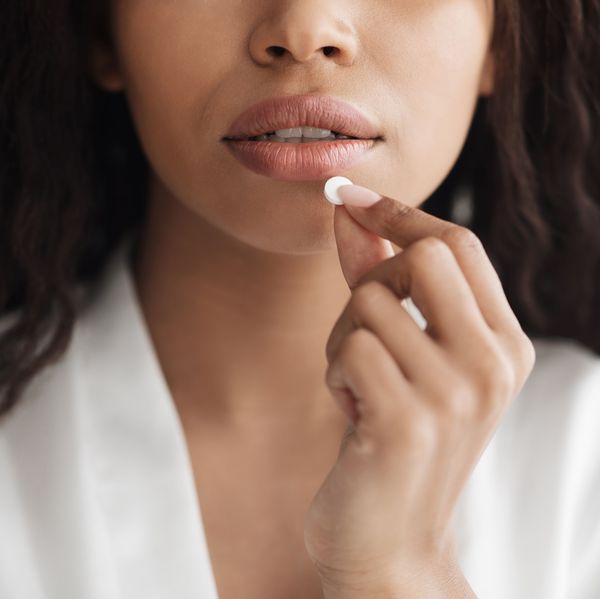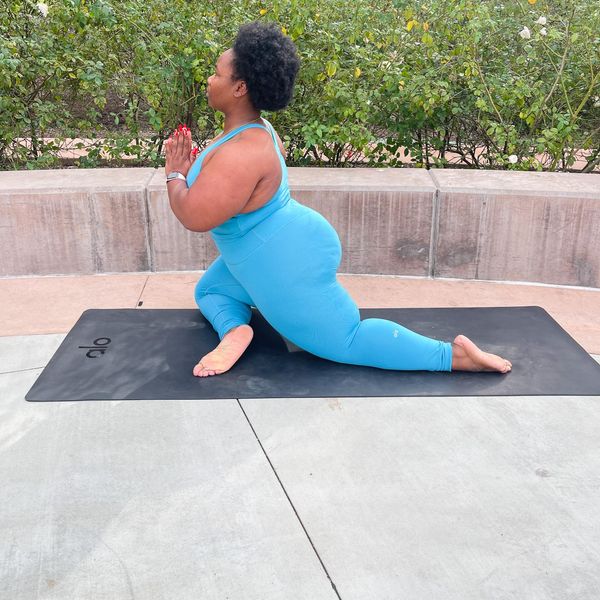
Are you more likely to recommend natural remedies or pharmaceutical drugs when treating minor ailments? Throughout my childhood and most of adulthood, I preferred the latter.
At the first sign of a headache or menstrual cramps, I would head to my medicine cabinet. Filled with over-the-counter (OTC) pills and syrups, it rivaled the local drugstore's shelves. In mere minutes, I'd feel better, but it never occurred to me that non-prescription medication could be detrimental to my health.
My go-tos were painkillers like aspirin, ibuprofen, and naproxen which can cause long-term side effects including indigestion, ulcers, and gastrointestinal bleeding that may require hospitalization.
According to The British Journal of General Practice, "Non-steroidal anti-inflammatory drugs (NSAIDs) are responsible for 30% of hospital admissions for [adverse drug reactions] ADRs, mainly due to bleeding, heart attack, stroke, and renal damage."
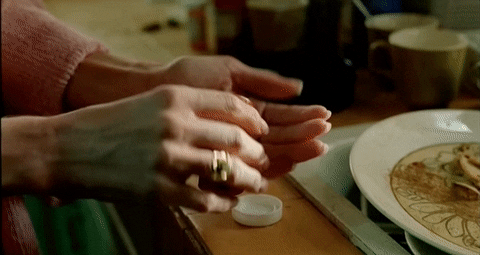
Using them sparingly reduces the likelihood of negative effects but it's not uncommon for some OTC meds to be used on a daily basis for other issues. A popular cold-and-flu medicine had been so widely used for sleeplessness that the brand created a formula specifically for treating insomnia. I've personally used this particular medicine for restlessness countless times before reading up on the recommended usage.
They warn that it should only be taken for "occasional sleeplessness" and advise that you should consult with a doctor if you're still experiencing trouble sleeping after two weeks of use. Considering that diphenhydramine, the main ingredient in some OTC sleep medications, can increase your risk of dementia, I decided to search for less harmful alternatives and stumbled upon herbal medicine.
Making the switch from traditional to natural medicine requires research and experimentation. It's an ongoing process, but I've found a few remedies that have replaced my past drugstore staples for good.
Ashwagandha Root
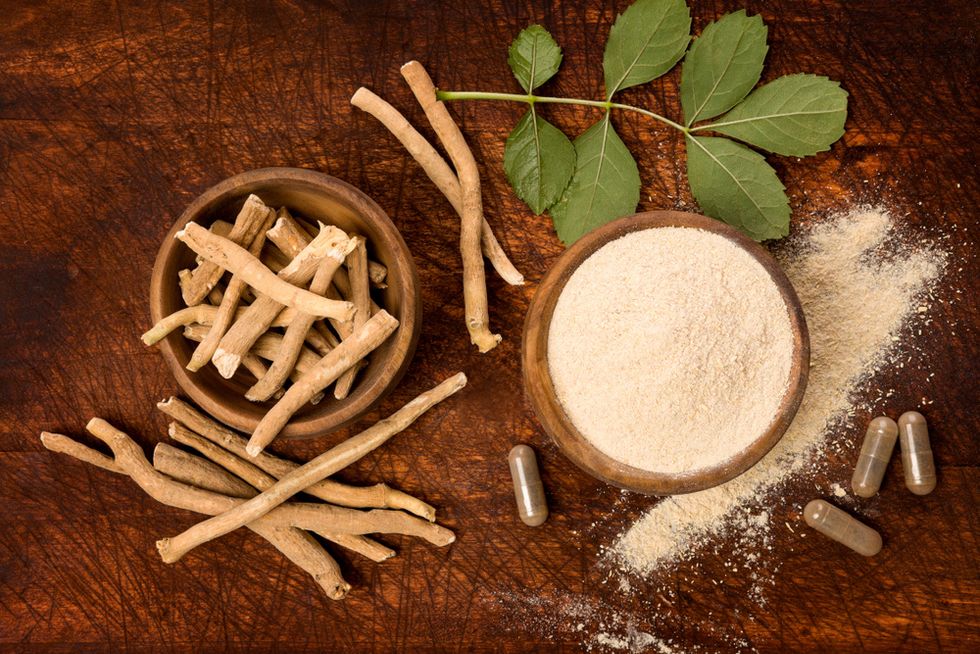
Image by Shutterstock
Ashwagandha is an Indian ayurvedic herb that has been successfully used to combat stress, anxiety, and inflammation. A 2012 study found that the stress levels of participants who took Ashwagandha root extract for 60 days were significantly reduced. The study required them to take capsules but I prefer it in tea form. I pack the loose tea in a strainer and drop it in a cup of boiling water. I usually let it steep for 10-15 minutes before consuming it. I prefer to take it at night because, within two hours, I can't stay awake.
Having Ashwagandha tea at least once a day has helped me reduce stress but more importantly, it has changed my sleep habits for the better. I am able to fall asleep and wake up much earlier, which allows me to get more done during the day. Regardless of which form you prefer to take it in, you can find Ashwagandha Root supplements, tea, or powder at your local and online health food store, tea shop, or Amazon.
Garlic & Ginger
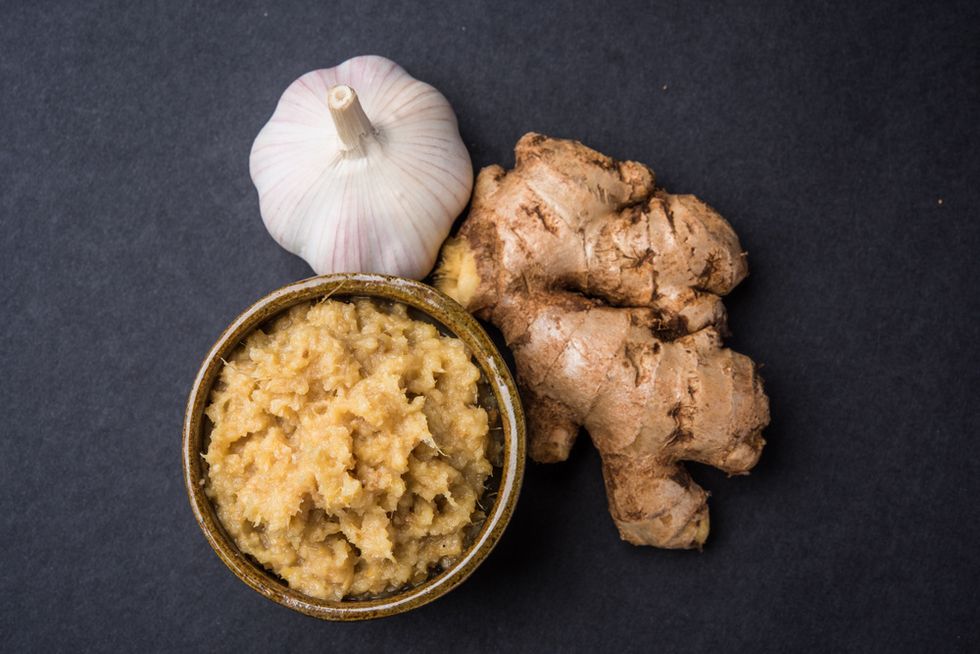
Image by Shutterstock
These are staple household spices used in nearly all of my family recipes but they're not just for satisfying your taste buds. Much like Ashwagandha, they have anti-inflammatory properties but these herbs are multifaceted. I always stock up on fresh garlic bulbs and ginger root whenever I feel a cold coming or during holidays when I have a tendency to binge-eat.
I make it into a tea by boiling the garlic bulbs and peeled ginger in a pot for 20 minutes before straining it into a mug. Although I throw the bits of ginger out, I toss the garlic into the mug and eat them after I'm done drinking the tea. Consuming raw garlic is almost painful but after boiling them they have a soft, mushy texture and are tasteless. This combo has prevented colds and reduced symptoms of nausea and bloating for me. If they aren't already in your pantry, you can easily find them in any grocery store.
Cannabidiol (CBD)
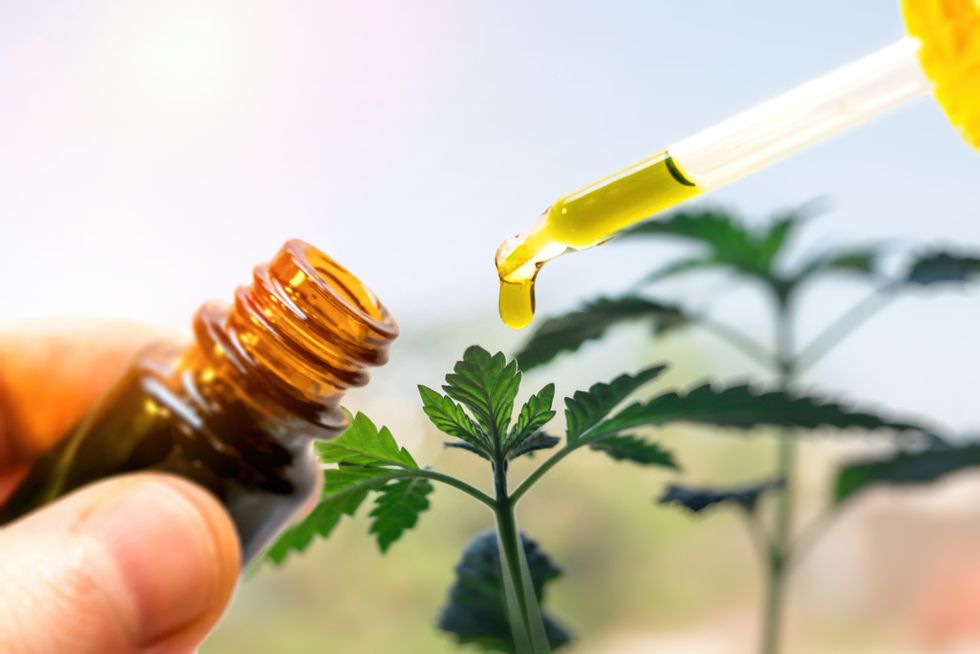
Image by Shutterstock
Like THC, it's derived from the cannabis plant but if you want to manage pain and anxiety without causing brain fog, fatigue, or failing a drug test, CBD is a life-saver. A rheumatoid arthritis support organization advocates for the use of the oil to treat symptoms of the condition. A European Journal of Pain study concluded that the topical use of CBD proved beneficial as well.
Full-spectrum CBD oil has helped me with less severe issues like body aches, migraines, and cramps without any adverse effects. Because of its non-psychoactive healing properties, CBD has recently gotten a lot of mainstream attention. Products containing CBD have popped up everywhere in drinks, oils, lotions, and foods just to name a few, but not all CBD products are made equal. As a result of its newfound success, the Food and Drug Administration is "continuing to evaluate the regulatory frameworks for products containing cannabis and cannabis-derived compounds" and warns of potential dangers.
I've personally found that the natural remedies I use are better for my overall well-being than conventional medicine, but you should always do your research. And of course, anyone who is thinking of trying a new natural or traditional medicine should consult with their doctor.
Want more stories like this? Sign up for our newsletter here and check out the related reads below:
Why I Decided Menstrual Cups Were The Answer For My Period
Overcome Premenstrual Dysphoric Disorder With These Natural Remedies
Featured Image by Shutterstock
Your December 2025 Monthly Horoscopes Are All About Surrender & Alignment
December is about letting go. We end the year with the need for more peace, reflection, and rejuvenation, and that is exactly what December is providing for us. The Sun is in Sagittarius, and anything is possible. This is the month to believe in that and to know that the universe is supporting you. With a Supermoon in Gemini as we begin the month as well, we have an opportunity to gain the closure we have been looking for this year and to wrap up old projects, ideas, and communication breakthroughs.
This is the month to make your peace the priority and let go of trying to control the way the tides are turning. Trust in your new beginning, and give yourself time to prepare for it this month.
A big part of the clarity that is coming through this month is due to Neptune going direct in Pisces on December 10, after being retrograde here since July. With Neptune now direct, we are able to see our inspiration and creativity a little more clearly, providing the perfect energy for dreams and manifestation to be built upon. The smoke is clearing, and it’s up to you to decide what you want to do with this newfound clarity that this transit is bringing. Mercury also moves back into Sagittarius on December 11, which is great for communication and clarity, and the adventures you were trying to see through at the beginning of November come around for you again with greater purpose and support.
On December 15, Mars enters Capricorn until the end of January 2026, and this is the extra push we need to make important changes and to be on the path towards greater abundance, stability, and prosperity. Mars in Capricorn takes care of business, and we have extra energy at our disposal during this time to do so. This transit is an ideal time to focus on your career or financial goals for next year and to start putting some of these plans into motion now. A few days later, we have the New Moon of the month, which will be in Sagittarius on December 19, and this is the perfect New Moon to manifest.
The energy is high, magic is in the air, and it’s all about moving forward with the new beginnings that are inspiring you and bringing you joy to think about right now.
Capricorn Season officially begins on December 21, and this earth sign energy is how we heal, gain closure, and build new foundations in our world. With Venus also moving into a Capricorn a few days later, there is something about peace, prosperity, and security that we are gaining in life and in love as we close out the year, and this is what we need right now. This month is about reflecting on what was, letting go of old hurt, and renewing. December is an ending and a new beginning in one, and there is magic in this space to be created.
Read for your sun and rising sign below to see what December 2025 has in store for you.
 AriesKyra Jay for xoNecole
AriesKyra Jay for xoNecoleARIES
December is a full-circle moment for you, Aries. You are seeing the gifts in your world and have a lot of gratitude for the way things have come about for you as of late. There are culminations in your world that are providing you with more abundance, stability, and community, and you are exactly where you are meant to be this month. With the Sun in a fellow fire sign and in your 9th house of travel for most of the month, December is a good time to get out of your comfort zone, explore the world around you, and get your body moving.
Mars, your ruling planet, also makes a change and moves into Capricorn on December 15, which will fuel your inspiration and power in your career space. You are making a lot of professional progress as we close out the year; however, make sure to be more mindful of your competitive drive right now. The New Moon on December 19 is the perfect opportunity for you to create some new plans and goals when it comes to traveling, education, and where you want to gain some new inspiration in your world. Overall, this is a month of things coming together for you serendipitously.
 TaurusKyra Jay for xoNecole
TaurusKyra Jay for xoNecoleTAURUS
December is about trusting your intuition, Taurus. You have a lot on your mind this month, and it’s best to delegate, communicate, and allow yourself some relief by opening up to someone and not feeling like you have to hold everything in. As we begin the month, we have a Supermoon in Gemini happening in your house of income, and the plans and projects you have been building here come to fruition for you now. This is the time to gain clarity on your financial world and to take a look at what spending habits you want to let go of here as well.
With Venus in your 8th house of shared resources for most of the month, you are doing a cleanse on your commitments, partnerships, and business ventures. You are taking a look at what you want to dedicate yourself to in the future, and what commitments you may need to let go of now in order to be in the space you truly want to be, both financially and within some of your relationship dynamics. Before we end the month, we have a New Moon in this same area of your chart, and it’s time to look at the opportunities that are presenting themselves and to trust your internal guidance system to lead you forward.
 GeminiKyra Jay for xoNecole
GeminiKyra Jay for xoNecoleGEMINI
You are moving forward fearlessly this month, Gemini. December is your month of love, passion, and dignity, and you are owning the light that you shine. We begin the month with the last Supermoon of the year, happening in your sign, and you are stepping up to the plate. You are showing up, owning how much you have grown this year, and allowing yourself to heal while also acknowledging that you have done your best and you deserve to have fun in the midst of the changes you are creating.
Mercury, your ruling planet, is officially out of retrograde, and you can use this energy to the fullest potential now. With Mercury in your 7th house of love, it’s time to speak from the heart and to talk about the things that matter and that are inspiring you right now to your loved ones. You never know what kind of epiphanies you may have when you open up the conversation to others. Before the month ends, you have a New Moon in this same love area of your chart, and this New Moon is all about manifesting romance, commitment, and abundance in your world.
 CancerKyra Jay for xoNecole
CancerKyra Jay for xoNecoleCANCER
December is an opening for more love, more joy, and more freedom in your life, Cancer. You have come to a place where you hold so much gratitude in your heart for where you are today and where your heart is shining, and things come together for you with more ease right now. With the Sun in your 6th house of health, work, and daily routines for most of the month, you are getting your ducks in a row while also putting more energy and effort into taking care of yourself, your priorities, and your well-being. This month surprises you in many ways, and it’s because you are showing up.
Mars and Venus both move into your house of love, relationships, marriage, and abundance this month, and you are making strides in your love life. You have both of these opposing forces on your side and are being recognized for the love you are while also receiving the love you want. This month, overall, is about focusing more on the positives in your world and letting your heart have its joy. Before December comes to an end, there is a New Moon in Sagittarius, and this is the perfect opportunity to create the plans you want to see through next year, especially when it comes to your work life, colleagues, business ventures, and health.
 LeoKyra Jay for xoNecole
LeoKyra Jay for xoNecoleLEO
The scales of karma are balancing, and they are balancing in your favor this month, Leo. December is your month of truth, and of seeing it clearly in your world. The Sun is in your house of romance, pleasure, and happiness for most of the month, and it’s time to relax, be in the present moment, and allow what is meant to be, to be. With a Supermoon in your 11th house of manifestation as December begins, this is a powerful month for seeing your dreams come to fruition, and for feeling like the intentions you have set this year are finally here for you now.
Mars also moves into your 6th house mid-month, and this is the perfect energy to have to move into the new year. You have extra energy at your disposal right now and are feeling fearless with what is possible for you and your daily routine. Before the month ends, we also have a New Moon in a fellow fire sign, Sagittarius, and this is a breakthrough moment for you and your heart. December, overall, wants to show you how loved and supported you are and will be doing so in magical, unexpected, and concrete ways.
 VirgoKyra Jay for xoNecole
VirgoKyra Jay for xoNecoleVIRGO
December is a month of victory, Virgo. You are showing up and experiencing some new successes in your world that move you forward on your path in life. With a Supermoon in your 10th house of career as we begin the month, the effort and intentions you have made this year come into full bloom, and you are being recognized for who you are and the good work you have done. This month is all about showing up and allowing yourself to be seen and loved, knowing that you deserve the support and opportunities you are receiving.
Mars moves into Capricorn on December 15, which brings the passion and excitement into your love life, hobbies, and little pleasures in life that light you up. You want to have fun this month and are going to be walking into the new year with this fearless, happy, and spontaneous energy within you. Before the month ends, Venus also enters Capricorn, and in this same area of your chart, you have a lot to look forward to and believe in right now. Overall, December wants you to be happy and will be doing everything possible to make that happen for you. This is your month to shine, Virgo.
 LibraKyra Jay for xoNecole
LibraKyra Jay for xoNecoleLIBRA
December is a month of opportunity for you, Libra. New doors open, and you are financially making breakthroughs this month because of it. December begins with a Supermoon in your 9th house, and you are getting a clearer view of where you have been making strides in your life and how it has all brought you here to this present moment of freedom. This month is showing you what happens when you are fearless with your purpose and when you believe in yourself and what you are worthy of.
Moving further into December, Mars moves into your 4th house of home and family mid-month, and you are closing out the year in your safe spaces. You are spending more time with your loved ones and taking the time to quiet your mind and listen to what your heart has been telling you. Before the month ends, we have a New Moon in Sagittarius, happening in an area of your life that deals with communication. This is a great time for getting the answers you have been looking for and for feeling more clear-headed and confident about the decisions you are making as you move into the new year.
 ScorpioKyra Jay for xoNecole
ScorpioKyra Jay for xoNecoleSCORPIO
Patience is a virtue this month, Scorpio. December is all about remaining patient and vigilant with what you are creating in your world, and knowing that the universe has your back. It’s time to be reminded of the power of hope, and this month is an opening to greater clarity in your life. There is a lot of energy in your financial zones right now, and this is providing you with new opportunities and new insight; however, the speed at which things come about for you may feel daunting. Keep your head up and eyes focused on what you want and know that you are more than worthy of receiving it.
With Mercury in your 2nd house of income this month, December is a good time to plant new seeds and to think about where you want to be financially a month from now or even a year. This month is asking you to think bigger and to think more long-term so that you can set the appropriate plans into motion now. We also have a New Moon in your house of income before the month ends, and this is when you will see more of your dreams come to fruition in this area of your life, and have more opportunities to build. Overall, December will be teaching you a lot, Scorpio.
 SagittariusKyra Jay for xoNecole
SagittariusKyra Jay for xoNecoleSAGITTARIUS
Sagittarius Season is here, and there is a lot in store for you this month, Sag. December is all about what you are dedicating yourself to. It’s about setting your intentions and putting the work in to back up your dreams, and about getting things in order so that when the new beginnings come, you are ready for them. The Sun and Venus are in your sign for most of this month, and there are a lot of eyes on you right now. You have the potential to create a new beginning for yourself, and it’s time to invest in yourself, your love life, and your dreams.
Mercury moves into Sagittarius on December 11, and this is giving you another opportunity to see through some of the plans that you had initiated in November. Mercury was retrograde in your sign last month, and there may have been some disruptions to your vision and plans for the future, and now this energy is turning around for you. Before the month ends, we also have a New Moon in Sagittarius, and you are walking through new doors fearlessly. You are catching others by surprise by your growth this month, and you are thinking a lot about your purpose, future, and plans for the new year.
 CapricornKyra Jay for xoNecole
CapricornKyra Jay for xoNecoleCAPRICORN
December is all about the vision, Capricorn. You are moving through a lot of changes and transformations this month, yet they are giving you a chance at a new beginning in the process. You are focused more on the future and what goals you want to manifest for yourself right now, and are ready to let go of what hasn’t been working for you. With the Sun in your 12th house of closure for most of December, this is your time for healing, but remember, healing doesn’t have to be isolating or boring; you can thrive while you renew, and you are this month.
Mid-month, the excitement picks up for you, and you are feeling more energized than you have in a while. Mars moves into Capricorn until the end of January 2026, and you are being proactive with your goals, intentions, and passions. You are a force to be reckoned with this month, and you are making things happen for yourself with confidence. Capricorn Season officially begins on December 21 this year, and this is definitely speeding up your healing process. You are breaking free from what was, and with Venus also moving into Capricorn before the month ends, you are leaving this year in high spirits and with love opening a new door for you.
 AquariusKyra Jay for xoNecole
AquariusKyra Jay for xoNecoleAQUARIUS
December is all about community, creativity, and manifestation, Aquarius. This is the month to work together with others to help bring your dreams to life. You are in a space of inspiration, empowerment, and beauty, and are creating more of this energy around you and in your world. Look out for what support comes your way this month and know that you don’t have to do everything alone to succeed. With the Sun in your 11th house of manifestation and friendship, your intentions are coming to fruition, and it’s time to celebrate with the people you love and to own how far you have come this year.
On December 19, we have a New Moon in Sagittarius, lighting up your life in all of the best ways possible. This is your New Moon of freedom, victory, and magic, and you are seeing new beginnings appear that you were once just hoping for. Before the month comes to an end, Venus moves into your 12th house of closure, and after an active and successful month, you are ready to relax, heal, and give your heart some of the attention it has been asking for. You are moving into the new year with the need to release and renew what hasn’t been working in your relationships, and you are finally ready to.
 PiscesKyra Jay for xoNecole
PiscesKyra Jay for xoNecolePISCES
December is a big month for you, Pisces. You are making some huge accomplishments this month, and are feeling like everything you have been through this year has been worth it for these moments that are coming to fruition for you now. The Sun is in your 10th house of career and reputation for most of the month, and this is where a lot of your focus is right now. You are claiming your successes and putting yourself out there in ways that not only serve you, but that inspire others as well.
Neptune officially goes direct on December 10, after being retrograde in your sign since July, and you are finally seeing things a little more clearly. You are feeling renewed inspiration and passion in your life, and your intuition is your strongest asset right now. Before December comes to an end, we also have a New Moon in your 10th house of career, and what happens now not only changes things for you in the present, but it also opens new doors and what is possible for you in the new year as well. Overall, you are on top of your game this month and are owning the joy and empowerment you feel.
Featured image by Kyra Jay for xoNecole
Don Benjamin On New Projects, Family & How He And His Wife Healed After Public Split
Actor and model Don Benjamin continues to expand in his career while also being a present husband and father. We first learned of the model in 2013, competing on America's Next Top Model Cycle 20, and now he's starring in major films like the recent Jordan Peele movie HIM and Adopted 2.
He was even the leading man in Cardi B's latest music video "Safe," which also features Kehlani. In an exclusive xoNecole interview, Don opens up about his family and this phase in his life.
"Honestly, the funny thing is, it's just like any other phase," he admits. "I just focus on work and growth and leveling up. I'm super excited about this moment because now, I'm finally tapping more into my acting side of stuff." He also shows off his acting skills on social media. Don, along with his wife, Liane V, often shares cute family skits on their respective Instagram and TikTok pages.
The couple share two kids, 2-year-old daughter Zaia Sky and Zaiden, who they had in June 2025. According to Don, Zaia is already following in his footsteps. "She's already doing more modeling jobs than me as of lately, and we want to get her in some acting. She loves the camera," he says. "It'll be nice to see if she follows in my footsteps, and I can kind of help line some things up for her."
Don and Liane have been married for four years, but had a very public breakup the year before. The Scared Famous star reveals how they did the work to heal and move forward together.
"We had our time to separate and work on self-growth, things that I needed to do for myself as a man, and working with life coaches and therapists, and she got the time to do what she needed to do. So when we came back together, we were in the right space mentally. We got a relationship coach that we can go through things with and talk about and work on and these things were important for us. Now, over the years, I feel like that actually helped us come closer together. That moment helped us come closer together."
"We had our time to separate and work on self growth, things that I needed to do for myself as a man, and working with life coaches and therapists, and she got the time to do what she needed to do. So when we came back together, we were in the right space mentally."
He continues, "I did what I had to do to understand [that] as a man, I never really had any male guidance in my life. So it was able to align me with the right coaches and pastors and therapists and people that I needed to align with to work on things that I had been dealing with in life. Then she got the space that she needed as a woman to work on her independence.
"We came back together strong, and now we were able to get married in the right space. A lot of times, people jump into marriage when they're not fully healed or in the right headspace. So we were able to get married in that right space. For us, it's been a beautiful thing, and we're able to use that as as an example."
Don also believes it's important to set an example for their kids, especially when it comes to love and respect. While the actor grew up without his dad, he has made it his priority to instill love in his kids by showing up for them and giving them words of affirmations.
As far as what's next for Don, he is starring and executive producing a paranormal activity film titled, holySmoke. "I'm loving the drama and horror space right now," he says.
"I always love a good romantic comedy, but right now. I seem to be getting reeled into all these horror films and thrillers and dramas."
Let’s make things inbox official! Sign up for the xoNecole newsletter for love, wellness, career, and exclusive content delivered straight to your inbox.
Feature image Nikita Melvil



